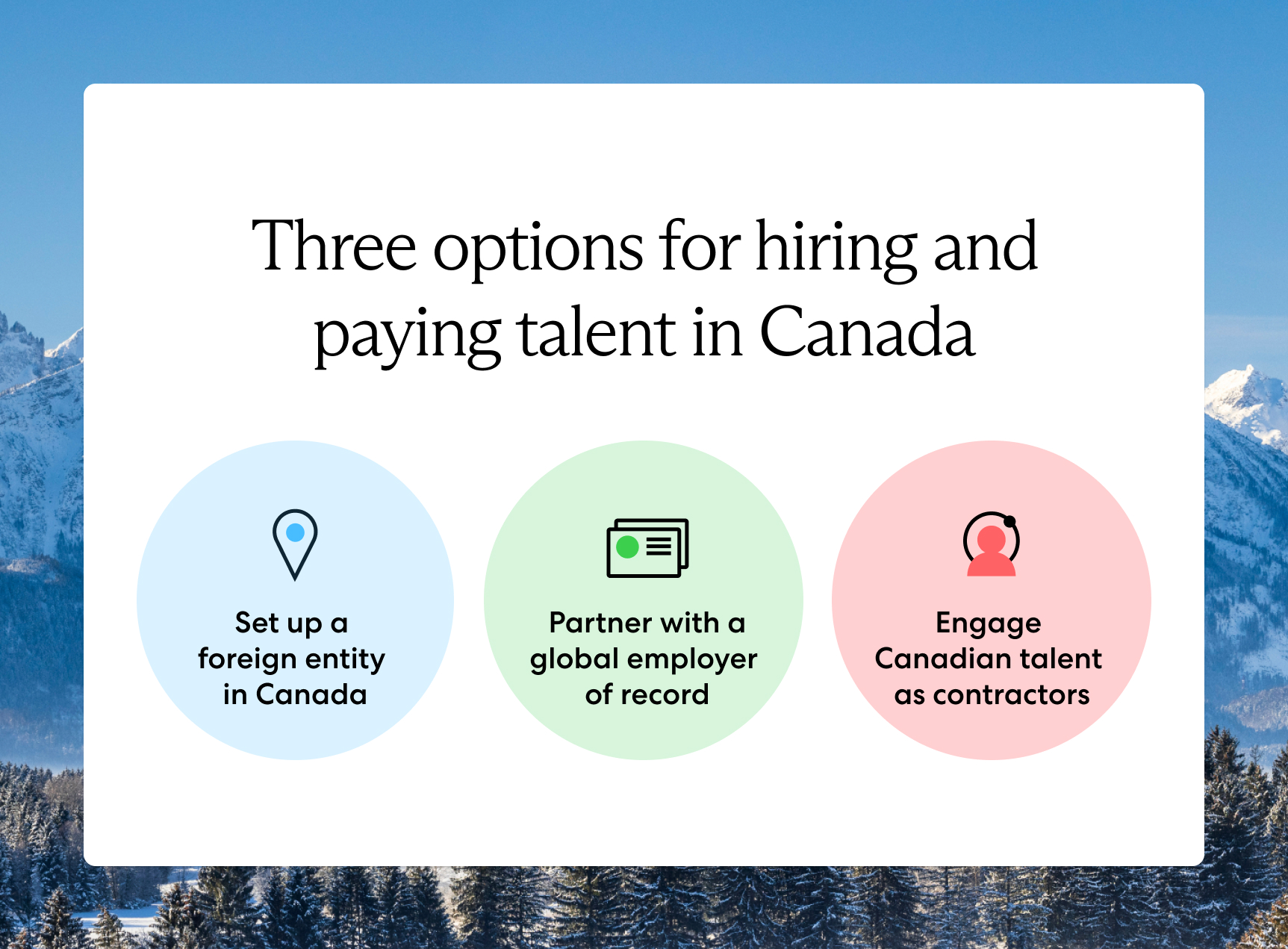Canada’s highly skilled, diverse workforce is a valuable resource for U.S. companies. By tapping into the Canadian market, American companies can source qualified employees from a large talent pool whose local business practices and norms are relatively similar to those in the U.S.
Still, U.S. companies face serious compliance risks when engaging talent in Canada, such as navigating the varying employment and tax regulations between provinces.
Fortunately, hiring employees in Canada doesn’t have to be overwhelming. This guide covers everything U.S. companies need to know about quickly and compliantly hiring employees in this market.
Can a U.S. company hire a Canadian employee?
Yes, U.S. companies can hire Canadian employees. By setting up a Canadian entity, partnering with an employer of record, or engaging contractors, U.S. companies can compliantly engage talent from Canada’s highly skilled, diverse workforce and enjoy the many growth opportunities this market has to offer.
How to hire an employee in Canada
U.S. companies can hire employees in Canada in the following three ways:
- Setting up a local entity. Entity establishment reduces risk exposure and enables direct hiring, but it’s costly and time-consuming.
- Partnering with an employer of record. An employer of record (EOR) is a third-party entity that serves as the legal employer of your international workforce. An EOR hires, pays, and manages your Canadian employees while ensuring compliance.
- Hiring Canadian contractors. Hiring contractors gives U.S. companies a flexible, affordable alternative to hiring Canadian employees, though it involves unique risks.
We discuss each approach in detail below.

1. Setting up a foreign enitity in Canada
Establishing a Canadian entity allows you to create a local branch or subsidiary, giving your company full autonomy over hiring and onboarding. By establishing a direct presence, U.S. companies also deal with fewer employment costs in the long run.
Entity establishment is a good option if you plan to hire a large Canadian team or establish a long-term presence in the country.
However, entity establishment is an extensive, costly, and time-consuming process. It requires in-country expertise with local employment and tax regulations and can delay your ability to hire Canadian talent for many months.
If you’re not ready to make long-term investments in Canada or you only plan to hire a small team in the country, entity establishment is usually more trouble than it’s worth.
2. Partnering with an employer of record (EOR) in Canada
A quick and compliant way to hire Canadian employees without undergoing entity establishment is to partner with a Canadian EOR.
An EOR is a third-party entity that hires, pays, and manages your global workforce on your behalf, allowing you to quickly engage international talent without setting up local entities or worrying about violating local employment regulations.
An EOR handles everything from hiring, onboarding, and compliance to administering global benefits, running global payroll, facilitating global mobility, and providing ongoing HR support so you can continue owning your daily duties while building a distributed team across Canada.
Partnering with an EOR is an ideal option for companies that want to test the Canadian market before making long-term investments or for companies that want to engage local talent while undergoing incorporation.
Learn more: What Is an Employer of Record (EOR)?
3. Hiring and paying Canadian contractors
Another option for quickly building a Canadian workforce is to engage local contractors. A contractor provides their services as a self-employed individual, allowing U.S. companies more flexibility and cost savings when targeting talent for one-off projects or sourcing talent with specialized skills.
As with the U.S., a Canadian contractor is treated independently from the company’s employees. Companies do not pay contractors fixed salaries, provide them with work equipment, or control their schedules and work methods.
Despite its benefits, engaging contractors involves a serious misclassification risk. Employers may unknowingly breach local laws regulating the employer-contractor relationship and face serious financial penalties.
Consider the following example: A U.S. employer provides a Canadian contractor with work equipment and offers them regular monthly payments. According to Canadian regulations, this establishes an employee-employer relationship between the two parties, subjecting the employer to employee back pay and fines.
We cover misclassification risk in more detail below.
Read also: Hire a Contractor vs. Employee: Which Is Best For Your Business?
How much does it cost to hire an employee in Canada?
The cost of hiring an employee in Canada is, at minimum, equal to the employee's gross salary plus mandatory employer payroll contributions. However, mandatory payroll contributions vary across Canadian regions.
For example, employers who hire employees in Quebec must contribute taxes to various federal schemes, such as Employment Insurance, Workers' Compensation, and the Provincial Health Fund, while also contributing taxes to Quebec-specific schemes, such as the Quebec Pension Plan and the Quebec Parental Insurance Plan.
Interested in hiring employees in Canada? Use our employee cost calculator below to get reliable insights into employee costs and payroll contributions in Canada:
Compliance risks when hiring employees in Canada
When hiring across international borders, compliance risks are always a factor. U.S. companies must exercise due diligence with local tax and employment regulations to avoid fines, litigation, and limited business opportunities when building a Canadian workforce.
The main challenges U.S. companies face when hiring Canadian employees involve the following:
- Running compliant payroll
- Permanent establishment
- Misclassification risk
- Varying provincial employment regulations
We discuss each of these in detail below.
Running compliant payroll
Payroll taxes and contributions in Canada differ significantly from those in the U.S. With more statutory employee benefits in Canada than in the U.S., like public healthcare, U.S. companies may be unfamiliar with the payroll contributions they are liable for when hiring employees in this market.
To ensure payroll compliance, U.S. employers must factor in the following contributions for each Canadian employee:
- Pension. This fund provides income support for retired employees. Employees residing in Quebec contribute to the Quebec Pension Plan (QPP), while employees residing elsewhere pay into the Canada Pension Plan (CPP).
- Employment Insurance (EI). The EI fund provides income support for unemployed individuals or those taking time off work for covered life events, such as maternity leave.
- Provincial healthcare insurance. This is the state-backed healthcare fund. Coverage and contribution rates vary between provinces and territories.
- Workers’ compensation. This fund covers medical costs and provides income support for employees who get injured on the job.
- Survivor insurance. Like life insurance, survivor insurance provides monthly payments to spouses or common-law partners and dependant children of deceased employees.
Learn more: Payroll and Tax in Canada: An Overview for Global Employers
Permanent establishment
If your company generates revenue in any capacity in Canada, there is a chance it has permanent establishment status and is subject to local corporate taxation.
The most common instance that triggers permanent establishment in Canada is when a foreign company has a fixed place of business in the country, such as an office, warehouse, oil well, or mine. However, even hiring a local agent to close contracts in Canada on your behalf can trigger permanent establishment.
Having an ongoing and stable presence in another country can be beneficial, but it’s important to understand the local corporate tax liabilities that you may be subject to. Failure to discern your permanent establishment status can lead to tax arrears and financial penalties.
Misclassification risk
All employers in Canada must correctly classify their Canadian employees and contractors according to local regulations; otherwise, they face serious penalties.
Companies that engage Canadian contractors often face a greater risk than those who hire employees, as those who engage contractors must be extra careful not to establish an employee-employer relationship with their workers.
Imagine you hire a contractor in Canada and end up controlling their work schedule, providing them with tools, or maintaining an exclusive relationship with them. Local authorities will classify that worker as an employee under local regulations, subjecting you to back wages, fines, and reputational damage.
U.S.-based companies that hire Canadian employees must also consider their tax reporting obligations at home and in Canada. Anytime a U.S. company engages talent abroad, they must submit Form W-8BEN to the IRS to classify their worker’s status as a non-U.S. citizen and determine their reporting and withholding obligations in the U.S.
Read our complete guide to employee and contractor misclassification.
Varying provincial employment regulations
One of the biggest challenges U.S. companies face when building a distributed workforce in Canada is ensuring compliance with the varying employment and payroll tax regulations between provinces.
Health insurance and workers' compensation are just a few statutory benefits in Canada whose contribution rates differ greatly between regions. Take British Columbia (B.C.) and Manitoba, for example: Employer contribution rates for healthcare in B.C. range from 1.95% to 2.925% depending on payroll size, whereas in Manitoba, they range from 2.15% to 4.3%.
The minimum wage also varies between provinces, ranging from CA$14 (US$10.39) in Saskatchewan to CA$16.77 (US$12.45) in the Yukon.
Keep in mind that while some federal programs apply to employers nationwide, Quebec is an exception in some cases. For instance, the Canada Pension Plan (CPP) is a federally funded pension program that applies to employers across all of Canada, except in Quebec. Employers in Quebec contribute to a separate pension fund called the Quebec Pension Plan (QPP).
While building a distributed workforce across Canada comes with many benefits, remember that as an employer you’ll be subject to different payroll tax and employment regulations in each region where you hire employees, creating an added compliance risk.
Learn more: Canadian Employment Laws: A Complete Guide for Global Companies
Compliantly hire employees in Canada with Velocity Global
Tapping into the Canadian market is a savvy move for growing your global workforce. Still, hiring Canadian employees from the U.S. comes with serious risks. Eliminate the headache by partnering with Velocity Global.
An experienced partner like Velocity Global makes it easy for U.S. companies to quickly and compliantly build and support distributed teams in more than 185 countries, including Canada, without establishing entities.
Our EOR solution handles everything from hiring, onboarding, risk mitigation, immigration, and relocation to administering global benefits, running global payroll, and providing ongoing HR support so you can build your dream team in Canada without the added burden.
Contact Velocity Global today to learn how to quickly and compliantly hire employees in Canada and expand into this market with ease.



